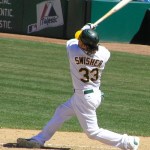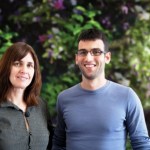Computer Science
So, The Research Works Act, H.R. 3699 is a new piece of legislation that is being introduced in the US.
Not surprisingly it's supported by the American Association of Publishers and its Professional and Scholarly Publishing (AAP/PSP).
The legislation is aimed at preventing regulatory interference with private-sector research publishers in the production, peer review and publication of scientific, medical, technical, humanities, legal and scholarly journal articles. This sector represents tens of thousands of articles which report on, analyze and interpret original research; more than 30,000 U…
Nick Swisher, the prospect the traditional scouts and statisticians agreed upon.
After watching the film "Moneyball" with my young son about professional baseball and the struggle to build a strong team on a shoestring budget, I wondered "What really determines a player's salary?"
Is it how telegenic they are? Provocative, reckless? A reliable hitter? How many walks?
What do you think? A research group at MIT took on this question from, of course, a mathematical and computer science point of view. To address this and many other questions, they developed an entirely new way to mine…
Is it possible to perform operations on encrypted data, while keeping it secure from all prying eyes (or circuits), even if that data is stored remotely, in the "cloud?" Will our end result still be encrypted, and when we decode it with our private decryption key, will our result be correct? To put it another way, could we allow sensitive data - say private medical information - to be monitored on-line and feel completely secure in the knowledge that no one can access it without our express permission? Can we use a cloud service to store our encrypted data and perform a search on that data…
Computer science and computer science education are a couple of my evergreen topics here on this blog, as you can see by perusing the computer science tag.
And of course, my trip to Harvard for LIAL this past summer perhaps has that institution on my radar a bit more than usual.
So how wonderful is it to find a way to connect those two things?
Along comes Hacking Stereotypes by Steve Kolowich.
It's about a program called HackHarvard which is part of a series of efforts at Harvard to encourage technology entrepreneurship: and increase enrollments in their basic computing course,
HackHarvard,…
The New York Review of Books has a great group review of some recentish books on everyone's favourite Internet behemoth: Google.
And they all look pretty interesting! (And I may have featured a couple of these before.)
In The Plex: How Google Thinks, Works, and Shapes Our Lives by Steven Levy (ISBN-13: 978-1416596585)
In barely a decade Google has made itself a global brand bigger than Coca-Cola or GE; it has created more wealth faster than any company in history; it dominates the information economy. How did that happen? It happened more or less in plain sight. Google has many secrets but…
As I ease myself back into the swing of things after a couple of weeks off and start to pay attention again to what's going on in the online world, I thought I'd bring this post to the attention of as wide an audience as possible.
It's The importance of language and framing, part eleventy-thousand by Amy Csizmar Dalal on her blog, This is what a computer scientist looks like.
Dalal draws a link between the decline in female CS enrollments since they peaked in the 1980s and the way we talk about entering the field in very competitive language rather than emphasizing mentoring or collaboration…
I'll be at the 2011 ACM/IEEE Joint Conference on Digital Libraries at the University of Ottawa for the next few days. I plan on doing a bit of tweeting while I'm there but probably no live blogging.
I hope to have a summary post up here sometime after the conference with my impressions. Taking advantage of the relative proximity of Ottawa, this will be my first time at JCDL and I'm really looking forward to it. It's probably a bit more technical than I've been getting into recently but stretching the mind is always a good thing.
I hope to see some of you there. Definitely if you're…
I have a whole pile of science-y book reviews on two of my older blogs, here and here. Both of those blogs have now been largely superseded by or merged into this one. So I'm going to be slowly moving the relevant reviews over here. I'll mostly be doing the posts one or two per weekend and I'll occasionally be merging two or more shorter reviews into one post here.
This one, of Everything Is Miscellaneous: The Power of the New Digital Disorder, is from August 14, 2007. (Weinberger left a detailed comment at the original post, for those that are interested.)
=======
David Weinberger's…
The standard commercial library citation tools, Web of Science (including their newish Proceedings product) and Scopus, have always been a bit iffy for computer science. That's mostly because computer science scholarship is largely conference-based rather than journal-based and those tools are tended to massively privilege the journal literature rather than conferences.
Of course, these citation tools are problematic at best for judging scholarly impact in any field, using them for CS is even more so. The flaws are really amplified.
A recent article in the Communications of the ACM goes…
As usual, a bunch of great new articles from the most recent ISTL!
Five Years Later: Predicting Student Use of Journals in a New Water Resources Graduate Program by Andrea A. Wirth and Margaret Mellinger, Oregon State University
Seeing the Forest of Information for the Trees of Papers: An Information Literacy Case Study in a Geography/Geology Class by Linda Blake and Tim Warner, West Virginia University
Local Citation Analysis of Graduate Biology Theses: Collection Development Implications by Laura Newton Miller, Carleton University
Career Motivations of the Scientist-Turned-Librarian: A…
Twitter brings us some truly wonderful and, yes, bizarre things. I saw this one a few days ago via Vitor Pamplona and thought it was too good to pass up.
Anyways, here's the story from the original Listverse post, Top 10 truly bizarre programming languages:
This is a list of some of the most bizarre programming languages you will ever see. These types of languages are usually called "Esoteric Programming Languages". An esoteric programming language (sometimes shortened to esolang) is a computer programming language designed either as a test of the boundaries of programming language design,…
I have a whole pile of science-y book reviews on two of my older blogs, here and here. Both of those blogs have now been largely superseded by or merged into this one. So I'm going to be slowly moving the relevant reviews over here. I'll mostly be doing the posts one or two per weekend and I'll occasionally be merging two or more shorter reviews into one post here.
This one, of Dreaming in Code: Two Dozen Programmers, Three Years, 4,732 Bugs, and One Quest for Transcendent Software, is from August 9, 2007.
=======
Every organization relies on software these days. Big custom systems,…
I have a whole pile of science-y book reviews on two of my older blogs, here and here. Both of those blogs have now been largely superseded by or merged into this one. So I'm going to be slowly moving the relevant reviews over here. I'll mostly be doing the posts one or two per weekend and I'll occasionally be merging two or more shorter reviews into one post here.
This post, from April 4, 2009, covered two books:
Content: Selected Essays on Technology, Creativity, Copyright, and the Future of the Future by Cory Doctorow
Mafiaboy: How I Cracked the Internet and Why It's Still Broken by…
Ok, this is just plain hysterical. And insightful. And both insightfully hysterical and hysterically insightful.
Enjoy.
Here's a taste, read the whole thing for yourself.
50. "Programming today is a race between software engineers striving to build bigger and better idiot-proof programs, and the universe trying to build bigger and better idiots. So far, the universe is winning."
- Rick Cook
38. "The use of COBOL cripples the mind; its teaching should therefore be regarded as a criminal offense."
- E.W. Dijkstra
17. "If McDonalds were run like a software company, one out of every hundred…
Two recent announcements that are worth noting here.
The first is for Digital Science, a Macmillan / Nature Publishing Group project involving some of the usual science online suspects like Timo Hannay and Kaitlin Thaney and some others in a really dynamic-looking multi-disciplinary team.
The press release is here and the about page here.
Digital Science provides software and information to support researchers and research administrators in their everyday work, with the ultimate aim of making science more productive through the use of technology. As well as developing our own solutions, we…
York University Computer Science & Engineering professor Anestis Toptsis was kind enough recently to invite me to speak to his CSE 3000 Professional Practice in Computing class.
He gave me two lecture sessions this term, one to talk about library-ish stuff. In other words, what third year students need to know about finding conference and journal articles (and other stuff too) for their assignments and projects. You can find my notes here, in the lecture 1 section.
In the second session, which I gave yesterday, he basically let me talk about anything that interested me. So, of course,…
In case you didn't know, reality is science fiction.
If you doubt me, read the news. Read, for example, this recent article in the New York Times about Carnegie Mellon's "Read the Web" program, in which a computer system called NELL (Never Ending Language Learner) is systematically reading the internet and analyzing sentences for semantic categories and facts, essentially teaching itself idiomatic English as well as educating itself in human affairs. Paging Vernor Vinge, right?
NELL reads the Web 24 hours a day, seven days a week, learning language like a human would -- cumulatively, over…
This year's Grace Hopper Celebration of Women in Computing took place this past week in Atlanta, GA.
I thought I'd gather together some small part of the blog posts I've been seeing floating around the Internets on this wonderful event.
Opening Session of Grace Hopper Conference - 2010
Dancing with Hundreds of Technical Women at Grace Hopper
The Impact of the Grace Hopper Celebration
It's the most wonderful time of the year
Back from GHC10@tlanta, now time to retrospect
Together, We Are Big Fish!
Grace Hopper Celebration 2010 : Day 2 (29 September)
Open Source Codeathon for Humanity (a…
That's the question Eugene Wallingford asks in a recent post at his blog, Knowing and Doing.
If you studied computer science, did your undergrad alma mater or your graduate school have a CS culture? Did any of your professors offer a coherent picture of CS as a serious intellectual discipline, worthy of study independent of specific technologies and languages?
In graduate school, my advisor and I talked philosophically about CS, artificial intelligence, and knowledge in a way that stoked my interest in computing as a coherent discipline. A few of my colleagues shared our interests, but many…
Some interesting articles, as usual, in the latest issue:
External Characteristics of Computer Operations: Toward Large Conversational Time-Sharing Systems by Wiehle, Hans Rudiger
First Edition Unix: Its Creation and Restoration by Toomey, Warren
The Network Information Center and its Archives by Feinler, Elizabeth
Promoting the Prosaic: The Case for Process-Control Computers by Aylen, Jonathan
There are also a few articles on the AEG-Telefunken TR 440 computer.


